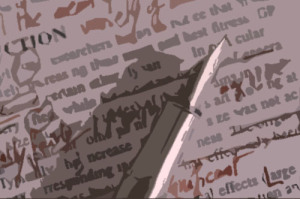You’re Too Picky

I’ve noticed a disturbing trend. At least for me it’s disturbing. It’s the, “You’re being too picky” trend.
In other words, people tell me that because I’m an editor, I notice things others don’t, and because most readers don’t care about these things, I should just get over it and stop correcting them.
To that I say: no.
Now, don’t get me wrong. Creative license is great. I’m not going to beat up a writer because they end a sentence in a preposition or they have a distinct writing style that may go against the rules, but it works for this author. That’s not what I’m talking about.
An example of what I’m referring to is, let’s say I’m reading a blog, and I see many spelling and grammatical errors. This causes a couple of problems.
1. I feel the writer is unprofessional. They’re posting something to be seen by the public, and they couldn’t bother to use spell check. This may sound harsh, but it becomes hard for me to take them seriously as an expert. If they’re this careless about their blog, could they also be careless with their facts?
2. When I read something that’s full of errors, it’s like I’m listening to a piece of music, humming along, getting into the groove, when I hear .,, TWAAAAAAANG. I try to get back into it, when … TWAAAAAAAAANG. I can no longer enjoy the song. Those sour notes ruin it for me.
If I’m reading along and all I’m thinking is, “why did they use ‘there’ when they meant ‘their’ ” the writer has lost me. I’m no longer concentrating on the message. Sometimes I’ll even try to keep going, but if there’s one mistake, there’s usually multiple.
Or let’s say an author is prone to using creative dialogue tags.
“Oh no!” she breathed.
“Oh yes,” he growled.
“But I love you!” she cried
“I’m leaving!” he stormed.
“You’ll never forget me,” she ground out.
These have become commonplace. Rather than letting the dialogue do the work, the author relies on the tag. If the writer puts more oomph into their dialogue, they won’t need those wacky dialogue tags.
I’m not talking about writers who occasionally throw in one or two. I’m talking about the ones who rely on them. A tag is supposed to be an utterance, something you’re not supposed to notice, and none of those qualify. “Ground out” only makes me think of baseball.
I don’t see this as a “style” if I can pick up ten books in a row and find the same tags.
What I call all of this is “lazy writing.”
There. I said it.
In the age of Twitter and texting and trying to grind sentences down to their lowest common denominator, readers have become more and more accepting of writing shortcuts. A spelling or grammatical error here and there? Who cares? And I’m the bad guy for trying to remove them. Because “It’s the story that matters.”
And what do we tell future generations? “Don’t try too hard. People won’t care!”
And again I ask why the writer would not want to put their best work out there. Why are they satisfied with sloppiness while pacifying themselves that readers won’t care? Why are they only surrounding themselves with people who tell them less than their best is okay?
What if they do have a fantastic story, but they lose some readers who just can’t overlook all the errors and shortcuts?
Is the reader at fault? Do we berate her for bailing on the story? I’ve seen it happen. The reader is told it’s her problem for not being able to look beyond all of the mistakes.
As an editor, if I let these go, I’m not doing my job. I’m saying it’s okay that writing, in general, is deteriorating.
If “the readers don’t care” the writers aren’t taxed with pushing themselves to come up with unique descriptions. They write “My heart clenched” and leave it at that. This is an example of a shortcut.
First, it sounds more like a medical condition, but also, it tells the reader absolutely nothing about what the character is going through. I can’t taste it or touch it or feel it in any way. Because it doesn’t mean anything. Whenever I see the words “My heart clenched” I feel the writer is trying to cheat me, the reader, out of a well-thought-out description. It’s all tell no show.
Instead of “my heart clenched” try:
I went through my morning routine. I woke up to my alarm clock after pressing the snooze button three times, grimaced at myself in the mirror, and went downstairs for some breakfast. But today, there was only his empty chair as company.
You can feel her heart clenching. You want to paint a picture for your reader.
I’m on Twitter, so I see people posting their pet peeves. They say they don’t want to see certain expressions any more. So it doesn’t hold true that readers don’t care. There are readers who expect the writer to put in a little effort.
I hold writers up to a certain standard. i will push them to try to come up with a description that’s better than, “He looked happier than a kid at Christmas” or “I love you more than a fat kid loves cake.”
I believe if you’re taking time to write a book or a blog and release it to the public, you shouldn’t cheat your readers by taking shortcuts. They may not mind, but how do you feel knowing you didn’t give your readers your best? These are your readers. You should give them your best.
I call that taking pride in your work. I call it professionalism.
But I would never call it being too picky.
I’m the Write Girl
imthewritegirl@gmail.com
424-781-7754Search
April 2024 M T W T F S S 1 2 3 4 5 6 7 8 9 10 11 12 13 14 15 16 17 18 19 20 21 22 23 24 25 26 27 28 29 30

